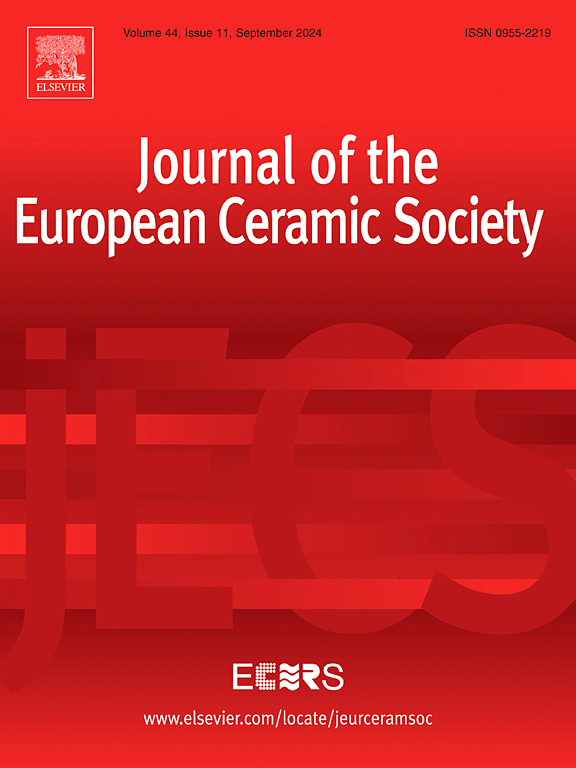通过超高位错密度印记实现耐损伤氧化物
IF 5.8
2区 材料科学
Q1 MATERIALS SCIENCE, CERAMICS
Journal of The European Ceramic Society
Pub Date : 2024-10-03
DOI:10.1016/j.jeurceramsoc.2024.116969
引用次数: 0
摘要
韧性陶瓷中的位错可提供强大的机械性能,同时释放出多种功能特性。以往的研究受到陶瓷中位错体积小和/或位错密度低的限制。在这里,我们使用布氏球划痕来创建无裂纹的大塑性区,为室温下的位错工程提供了一种简单而有效的方法。利用氧化镁,我们定制了高达 ∼1015 m-2 的高位错密度。我们通过化学蚀刻、电子通道对比成像和扫描透射电子显微镜分析了塑性区的特征,并进一步证明了在具有高密度位错的塑性区中,裂纹的产生和扩展可以被完全抑制。利用高分辨率电子反向散射衍射分析了塑性区的残余应力。在保留高密度位错的同时,通过热退火释放残余应力,我们发现裂纹不再被完全抑制,但位错的纯增韧效应依然明显。本文章由计算机程序翻译,如有差异,请以英文原文为准。
Damage-tolerant oxides by imprint of an ultra-high dislocation density
Dislocations in ductile ceramics offer the potential for robust mechanical performance while unlocking versatile functional properties. Previous studies have been limited by small volumes with dislocations and/or low dislocation densities in ceramics. Here, we use Brinell ball scratching to create crack-free, large plastic zones, offering a simple and effective method for dislocation engineering at room temperature. Using MgO, we tailor high dislocation densities up to ∼1015 m−2. We characterise the plastic zones by chemical etching, electron channelling contrast imaging, and scanning transmission electron microscopy, and further demonstrate that crack initiation and propagation in the plastic zones with high-density dislocations can be completely suppressed. The residual stresses in the plastic zones were analysed using high-resolution electron backscatter diffraction. With the residual stress being subsequently relieved via thermal annealing while retaining the high-density dislocations, we observe the cracks are no longer completely suppressed, but the pure toughening effect of the dislocations remains evident.
求助全文
通过发布文献求助,成功后即可免费获取论文全文。
去求助
来源期刊

Journal of The European Ceramic Society
工程技术-材料科学:硅酸盐
CiteScore
10.70
自引率
12.30%
发文量
863
审稿时长
35 days
期刊介绍:
The Journal of the European Ceramic Society publishes the results of original research and reviews relating to ceramic materials. Papers of either an experimental or theoretical character will be welcomed on a fully international basis. The emphasis is on novel generic science concerning the relationships between processing, microstructure and properties of polycrystalline ceramics consolidated at high temperature. Papers may relate to any of the conventional categories of ceramic: structural, functional, traditional or composite. The central objective is to sustain a high standard of research quality by means of appropriate reviewing procedures.
 求助内容:
求助内容: 应助结果提醒方式:
应助结果提醒方式:


